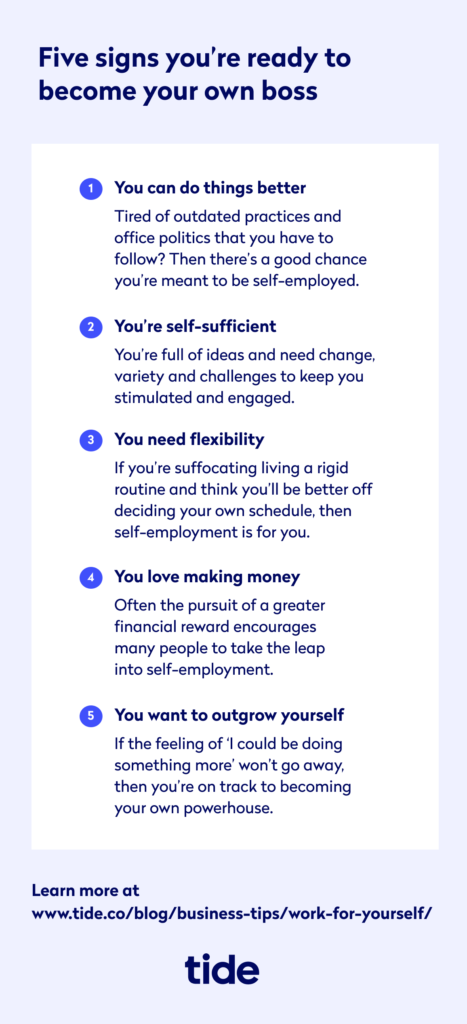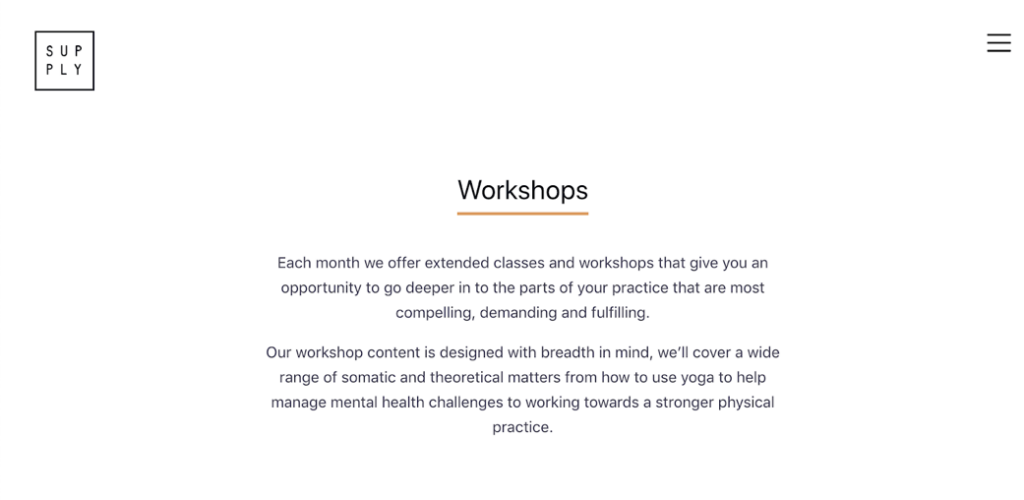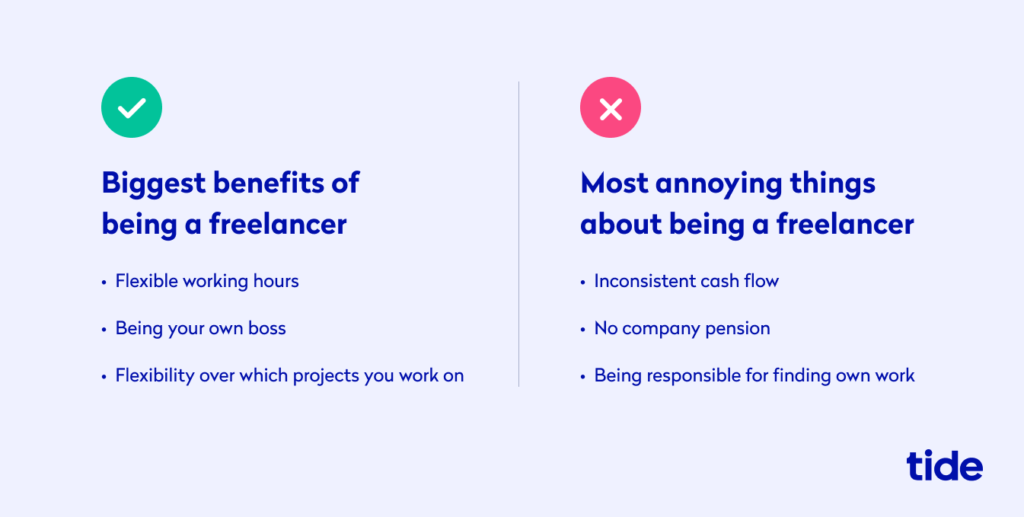
How to work for yourself: A complete guide

In the UK, approximately 15% of workers are self-employed. Before COVID-19, this number was steadily on the rise—there were more than 5 million self-employed people in the UK at the start of 2020 compared to just 3.2 million in 2000.
But COVID-19 seems to have briefly disrupted this steady growth—bringing into light the many benefits and potential drawbacks of self-employment during a pandemic (which we will discuss in the first section of this article).
If you’re reading this, you’re likely ready to take the leap to become an entrepreneur, freelancer, gig economy worker, or contractor and need some guidance on how to get started.
It’s important to keep top of mind that as with any new endeavour, working for yourself can be a huge risk and proper preparation is key.
In this article, we’ll outline the benefits of working for yourself, explain how to make the most of the freedom and opportunities it affords and offer 10 low-cost self-employment business ideas that you can get started with today.
Contents
- How has COVID-19 affected the UK self-employment industry?
- Why work for yourself?
- What are the benefits of working for yourself?
- Five signs you’re ready to become your own boss
- How to be productive when working for yourself
- 10 low-cost self-employment & business ideas
- Expert insights
- Wrapping up
How has COVID-19 affected the self-employment industry?
On the one hand, working for yourself gives you immense freedom over your schedule, the type of work you take on, the rates you charge and the location in which you work. In that nature, the circumstances of COVID-19 (e.g. working from home or being furloughed) means that people have newfound time and flexibility to start a side hustle to augment their income or create a brand new income stream.
On the other hand, since the start of the Coronavirus pandemic there are approximately 500,000 less self-employed people in the UK than before it began. This stems largely from the fact that even though many employed people are being furloughed and losing their jobs, self-employed people in general are more likely to be negatively affected by an economic crisis.
Statistics show that, relative to other workers, the majority of people that work for themselves have earned less money and experienced a dramatic drop in their amount of working hours. By contrast, only 9% of self-employed workers have seen an increase in earnings since the start of the pandemic.
Note: If you have experienced a drop in income and need some assistance, the government has recently extended the Self-Employment Income Support Scheme. Check out GOV.UK’s dedicated SEISS grant page to learn more.
All of this said, industry plays a big role in whether or not a self-employed person has been affected by this pandemic. Given that the industry with the most self-employed workers in the UK is construction, it makes sense that the economic downturn of the pandemic, and government guidelines, may have temporarily paused work in this regard.
But all of this data reflects people that were already self-employed before the pandemic began. There is certainly a great case to make for starting a new business or side hustle during this difficult time.
In fact, many businesses that start in a recession end up benefiting from less competition, the ability to access more grants or loans and the need to fill a gap in the market with emerging and innovative ideas.
With that in mind, let’s explore the benefits of working for yourself and exactly how to get started.
Why work for yourself?
People often wish to start their own business because they’re lured by the freedom of deciding their own hours and working location. You have an idea, and you want to make a mark on the world with your new product or service.
We work with small business owners every day, so we have the real scoop on the benefits of working for yourself and what signs you should look for if you’re thinking about taking the leap.
Tide member Kate recalls a similar situation: “I remember what it felt like to sit in an office for forty hours a week. Never again!” Read Pottery & Pints’ story on how Kate and her daughter started a business giving pottery classes in pubs.
What are the benefits of working for yourself?
You want to build a business because you have a vision for something greater. You may have a big idea, or a real passion to go it alone and build something you’re proud of.
You may also see a need or pain point in the market that you feel eager and motivated to fill. Given today’s circumstances, there are certainly many emerging opportunities to create new offerings for people that have been affected by COVID-19.
Whatever your motivation, let’s dive into these benefits to help convince you that you’re on the right path.
1. You’ll make more money
Once you work for yourself, you’ll find that you’re spending less money on certain things. No more commuting expenses or expensive lunch bills. You can also claim some of your household bills on your taxes such as internet, electricity and phone bills.
It can take some time to gain traction with a new product or service. But once you’ve validated your offering and found a message that resonates with your market, the growth opportunities can be endless.
Top Tip: That last point cannot be stated enough. The best way to set yourself up for success is to understand your target audience, learn what motivates them to make purchases, figure out where they find new information about brands and engage with them meaningfully (whether online or in person). To learn more about how to do all of this, read our 5-step guide to building an effective go-to-market (GTM) strategy 🚀
2. You can choose projects you’re passionate about
You don’t have to pursue things you aren’t interested in because you know that following your passion is a better way to succeed.
Take Kate Lindsey for example, who started The Natural Florist after having her second child:
“I decided I had to set up on my own and combine two things I was passionate about… floral design and being environmentally responsible, plus be my own boss and make money for me!”
Kate Lindsey, The Natural Florist

If you’re self-employed, particularly if you choose to become a freelancer, you can sign clients and projects that you’re most passionate about.
3. No more office politics
From clients, contractors to colleagues, you get to choose who you work with – and where to work from.
As your business grows, you’ll be free to work with the clients and projects you’re most passionate about. You’ll start to work on your own terms, and many entrepreneurs choose to minimise or eliminate meetings altogether. Think about the hours you’ll save that you can actually spend with your loved ones or learning a new skill.
Top Tip: Whilst we’re bombarded with things to look out for and be aware of when launching a business, we rarely hear about the things that might not quite turn out as we expect! Here are 5 things NOT to expect when launching a business put together by our member Ben, co-founder at Provius 🤔


Five signs you’re ready to become your own boss
You’re currently in investigation mode. Weighing the pros and cons of going at it solo or keeping your full-time or part-time job.
Many people who contemplate becoming self employed but don’t know what to do need time to get their heads together and come up with a viable launch plan.
It’s also likely you’re looking for validation. Someone to tell you that you’re meant to be working for yourself. Here are five signs that may resonate with you:


1. You’re convinced you can do things better
Ever felt like your boss recommended inefficient processes? Tired of outdated practices and office politics that you have to follow? Then there’s a good chance you’re meant to be self-employed.
Entrepreneurs don’t usually like taking orders and are obsessed with doing things efficiently and competently. To work for yourself is to get the job done on your own terms without worrying about a manager holding your growth back or cramping your work style.
Top Tip: In the same vein, you may crave becoming a great leader of your own team. If that’s you, and you plan on eventually hiring employees, it’s key to understand that there are many leadership styles that you can choose from and what you go with should align with your business goals and values. Besides the leadership style itself, there are also several leadership traits that successful leaders often share. To learn more about each, read our guides to 6 effective management styles to become a stronger leader and the 7 traits of effective leaders and how to adopt a servant leadership style ⚡️
2. You’re self-sufficient and resourceful
You’re full of ideas and need change, variety and challenges to keep you stimulated and engaged. Otherwise, you feel demotivated and switched off.
If you’re resourceful and know how to get things done without asking permission or someone holding your hand, then working for yourself should be your reality.
People who are naturally self-motivated, have a vision and like to lead can be great business owners.
3. You value & need flexibility
When you’re working for someone else, especially in the corporate world, you have to abide by certain rules which often includes set working hours. If you’re suffocating living a rigid routine and think you’ll be better off deciding your own schedule, then self-employment is for you.
Whilst flexibility within your day is a perk of working for yourself, business owners don’t necessarily work fewer hours. Often, it’s the opposite but they get to choose to do their job when it suits them.
4. You get a thrill out of making money
Often the pursuit of a greater financial reward encourages many people to take the leap into self-employment.
Let’s not forget: many traditional jobs don’t reward overtime. Becoming self-employed not only gives you a real opportunity to control your own financial future but your extra effort might actually pay off.
5. You want to achieve the highest version of yourself
You even play around with business ideas in your spare time and watch entrepreneurial videos on YouTube.
You feel that buzz in your stomach every single time Lord Sugar shows up on your feed. You just can’t wait to quit your job and start building an empire of your very own.
If the feeling of ‘I could be doing something more’ won’t go away, then you’re on track to becoming your own powerhouse.
Top Tip: Itching to launch your dream project but struggling to decide on what to do? Here are a few tips on how to choose the right business idea by our member Andy Mindel, founder of Shore Ride 💼


How to be productive when working for yourself
Working from home can be the best thing on earth. For many of us, working from home is a luxury we dream of, until we become our own worst enemy.
At home, no one’s watching. You don’t feel the social pressures or obligations to get things done. Of course, many more of us than usual are working from home due to COVID-19, but the pressures to work a normal workday in the traditional sense are certainly lessened when you’re working remotely.
Performance matters especially from home, so don’t fall into this trap. How can you stay productive, and live up to all of the expectations that you’ve set for yourself?
Well the good news is, you don’t need a cubicle to stay focused, you just need the tips below.
1. Structure your day like you would at the office
When working from home, you are your own personal manager. Without a schedule to structure your day, you can be quick to lose focus or burn out.
Generally speaking, we can focus on any given task for 90 to 120 minutes. And 15-20 minute breaks are needed to recharge and get the next task done. You can find out more about these productivity cycles from Tony Schwartz, author of “The Way We’re Working Isn’t Working”. Here is his talk at TEDxMidwest.
To stay on schedule, segment what you’ll do and when over the course of the day. Then add these time windows to your calendar as a mental safeguard of your time. Splitting your day into 90-minute windows will help you get out of the 8-10 hour workday that often feels like a marathon. This way, you’ll be more efficient and will have a target of completing four tasks a day.
2. Set boundaries and share your calendar
Working from home is a blessing when you have a family. The opportunity to spend more time with them and share more memories is priceless. But it can also hinder the growth of your business if you are more easily distracted by home-life.
When you work from home, your family, friends and flatmates can be the most frequent source of taking unwanted breaks.
People don’t necessarily respect the fact that while you’re working from home, you’re still working. So make sure you explain when you’ll be working and that you don’t want to be interrupted unless it’s an emergency.
Share your calendar with them if it makes it easier and sprinkle some tea breaks here and there where you could have a quick catch up.
The same can be said for setting boundaries with clients. If you don’t work on Sundays, don’t respond to emails on Sundays. Otherwise, you’ll train your clients to believe you’re available 24/7. If you’re still tempted to work on the weekend, you could use an email-scheduling tool like Boomerang. This will let you schedule an email you’ve written on Sunday to send on a weekday.
3. Stay active and healthy
When you work for yourself, you don’t have to commute, walk to the train station or even to your car. You don’t even have to walk to the pub next door to get after work drinks anymore so your active time can suffer. Make sure to develop healthy habits to find balance. Take a break, go outside and find reasons to get on your feet.
Take it from Andi, the founder, boss and sole employee of Eximo Marketing, a marketing consultancy with blue-chip clients:

“You’ve got to [stay fit]! Otherwise you fall ill. I place a real premium on sleep, bedtime routines and exercising. If you want to run a successful business, you’ve got to stay healthy!”
Andy Jarvis, Eximo Marketing
4. Choose and invest in a dedicated work space
Just because you’re not working from an office doesn’t mean you can’t have one of your own. Rather than cooping yourself on the sofa (spaces that are associated with leisure time), dedicate a specific room or corner in your home to work.
Trust me, your productivity (and your back!) will thank you for it. Also, invest in some good gear to streamline your work and make things run smoothly: laptop, phone and ergonomic chair. Whatever you need to not waste time, be comfortable and productive.
Think of it as an investment and not an expense. Although you can certainly claim it as an expense in your accounting (another joy of being your own boss).
Top Tip: To learn more about all of the expenses you can claim as a sole proprietor, including the ten most common types of expenses you’ll incur as a small business owner, read our guide to reimbursable expenses and how you can claim them💡
5. Turn off notifications (and the TV!)
Productive people cut-off any distractions that interrupt momentum or hinder performance.
Turning off alerts on your computer and phone will greatly improve your ability to focus. Chances are you won’t miss anything while you actually get your tasks completed.
If you’re struggling with this, use your browser’s incognito window when surfing the web to make sure you’re logged out of all accounts. On your phone, turn off notifications from social networks or even put your phone on plane mode.
6. Create a routine (and stick to it)
When you work for yourself, it’s easy to get carried away and work until you sleep. This can prove to be counterproductive and lead you to feel overwhelmed or burned out.
Create a morning and evening routine that suits you and stick by it. When you wake up, it’s go-time. Get up, clean up, fuel up and start rolling.
Make sure you take some time once per week to tidy up and clean your home. Perception becomes reality so when your workspace looks more productive, it will actually be more productive.
7. Nourish your drive
To work from home is to also feel left out from industry happenings and miss out on the buzz at the office. One way to combat the work from home blues is to frequently reach out to others for coffee chats (whether digital or in person) to exchange ideas and ignite the spark.
Attending in-person or online industry events, networking through LinkedIn, and pursuing any professional and personal development opportunity can help you create a ‘buzz’ that spurs your productivity.
Top Tip: Juggling parenthood with self-employment (or any kid of employment) can be tough. Here are 5 tested and approved productivity tips from a parent to other parents from the founder of the flexible working platform, Doyenne, Harvir Sangha ⚖️
10 low-cost self-employment & business ideas
Now that you know some of the pros and cons of working for yourself, here are some low-cost ideas to get you started on the path to self-employment.
Many business ideas already exist in the world and it can be difficult to come up with the right one to focus on. Especially if you’re looking for business ideas with low startup costs.
Here are 10 of the best self-employment and freelance ideas you could pursue:
1. Social media consultant
We’re all guilty of spending too much time on Facebook, Instagram, Twitter, LinkedIn, or Pinterest. That said, why not get paid to put your expertise and knowledge to work?
Many companies, especially startups, or even influencers, need all hands on deck when it comes to social media, so why not use your first-hand experience to help build their brands online?
Reach out to brands directly or look for opportunities on sites like LinkedIn. Over time, and as you grow, you can add additional services like Facebook Marketing or develop your one-person consultancy into a full-service agency with other contractors.
For example, our member Ian swapped his professional music career for marketing and launched social media consultancy Seriously Social:

Top Tip: You also don’t need to be a social media expert to learn more about how to use social media to your advantage. In fact, we’ve created a complete guide that can help you better understand the social media landscape, why it’s important to take advantage of it and what channels you should be pursuing. To learn more, read our complete guide to how to create a social media marketing strategy for your small business 📱
2. Yoga teacher
If you’re a fitness enthusiast and want to make people feel good about themselves, then you could start giving classes as a self-employed trainer. What better way to live your passion, work for yourself and make an impact on other people’s lives!
You could even start your own studio like Abi. She came up with her business idea after she heard about a community project in central Africa that focused on using yoga as a form of therapy for victims of sexual violence:

“I felt inspired and looked into what was happening locally to help me learn more”
Abi Nolan, Supply Yoga
3. Start an ecommerce store
Starting a retail operation can be a low-cost way to work for yourself. Products need to be either unique or low-cost to make them stand out. You can start selling via Ebay, Etsy, Depop or Amazon and work your way to having your own website.
If you’re more the creative type, you can make your own products (say cosmetics or candles) or sell your designs.
A couple of years ago, Vicky started creating and selling cheeky greeting cards online. And business is booming:

“[the greeting cards are] all based on the way best friends actually speak to each other, rather than the way traditional greeting card companies think we do.”
Vicky Simmons, Mean Mail
Top Tip: If you’re serious about starting an ecommerce business, you need more information about how to strategically make your mark in this highly competitive and thriving market. To learn exactly how to do that, read our guide to how to start an ecommerce business in 12 steps 📌
4. Food delivery
Food delivery is not a new business idea. However, it has evolved with technology coming into the forefront. Convenience is the common denominator of food delivery businesses – they promise to buy us time and save us effort.
So far, we’ve seen business models based on grocery delivery, meal-kit delivery, restaurant table booking, midnight food delivery, and more.
Take Brighton entrepreneur Minesh. He’s on a mission to help Brits make their own pukka Indian cuisine with his delivery business, The Kari Club:

Each month, subscribers get the recipes and ingredients they need to make authentic Indian dishes.
5. Repair work
If you can repair just about anything – cars, computers, furniture, appliances, or homes/buildings – you can start a repair business.
You might need to put in some cash for tools and perhaps even a vehicle, but once you build a reputation for yourself, you’ll probably have more work than you can handle on your own.
Bill and John took it a step further with Decked, importing and installing decking made out of rice husks to make it non slippery – a niche solution to a niche problem:

6. Consultant
A consultant is someone who’s knowledgeable on a particular subject and has the know-how to come into an organisation and help them fix or advise on a specific matter. That means you have expertise that other people are willing to pay for.
To get started, attend industry events and network relentlessly. If you can, use your previous career to get recommendations on contracts you can jump on.
When Deborah started her Brighton-based marketing consultancy, “Tell Me Something Good”, she deliberately went after smaller clients – the ones neglected by traditional agencies:

“The impact you can make on a small client on their branding, marketing and communications – within six months you’ll be able to see a tangible difference, right down to their bottom line.”
Deborah Benson, Tell Me Something Good
Top Tip: Similar to ecommerce, consulting is a thriving industry with tons of opportunities to take advantage of. To learn more about how to make your mark in this market, read our guide to how to start a consulting business and get your first clients 📣
7. Video producer
If you’re into video production and film, why not start your own video producing business?
YouTube provides individuals and companies monetisation opportunities. If you decide to make business videos, then create an online portfolio using Vimeo, YouTube or Facebook.
Even if it’s only one video on a Facebook page, go ahead and upload that one video. If you want to go into the business of doing wedding videos, then have a Vimeo page of just wedding videos.
Jacob James and Isabel Lea, two of our Tide members, worked on a project with Panasonic to showcase their Lumix camera range.

They were commissioned to shoot the visuals for the launch of the new Lumix S series in the Peak District – a remarkable achievement for such young talents.
Top Tip: Statistics show that video attracts 300% more traffic and helps to nurture leads. And you certainly don’t have to be an expert to strategically use video to your advantage. Most social media platforms offer a video experience, like Facebook and Instagram stories and live or Instagram TV (IGTV). To learn more about how to use video to your advantage, read our guide to how to grow your small business using video marketing 📹
8. Life coaching
Beyond the business plans and nitty gritty of setting up on your own, to become a successful life coach you need actual life experience. You also need the skills and belief that you can make a difference.
If you have no credentials or background in the business, start by volunteering as a coach in your local community then use networking events to build your track record.
“I help individuals get past blocks in their lives, and improve their health,” says Alison, founder of Anderida Coaching. “Some want to give up smoking or an addiction. I also train executives and employees to manage stress, and perform and communicate better.”
Top Tip: Speaking of networking events, the best way to make the most of them is to understand how to meaningfully connect with the other attendees. To learn some tips and tricks to help you do just that, read our guide that outlines 5 useful small business networking tips for entrepreneurs 🌟
9. Event planning
Your mind went straight to wedding planning, right? Well, you could consider that option. But in reality, event planning can include birthdays, company retreats, and corporate events.
Start with an online portfolio and social media presence to get your first clients. Then make sure you do a great job for your clients. Word of mouth referrals can help you build your clientele in no time.
Rita’s solution was to create a promotion and event space consultancy which would act as a matchmaker between brands and locations. Today it boasts an impressive client list which includes big names like the Henley Royal Regatta, TalkTalk and Pimms and has a 100% customer retention rate.
10. Graphic design
Graphic design is a very broad industry. There are lots of avenues to explore. So if you want to start your own graphic design business, you need to understand your own skill level and skill set.
You’ll also need to figure out exactly what your prospective clients expect from a graphic designer, what you can bring to the table and what services are in demand. Start by doing some work on the side and build up your portfolio. Graphic design can include:
- Brand strategy
- Logo design
- Web design
- Social media design
- Animation
- Typography
- Brochure design
- Infographics
- Poster design
For example, Claudine moved to London to study graphic design at the London College of Communication. A day job in design followed, while her art was relegated to evenings and weekends, as she slowly amassed freelance commissions:

It was only a couple of years ago when the work began piling up and she was “unable to sleep very much or have weekends” that she decided to take the plunge and set up as a full-time freelance artist.
If you’re not sure where to start, graphic design has tons of freelancing opportunities. In fact, freelancing can be one of the best ways to test out a skill to see if you enjoy it enough to make it your full time job.
Here are some benefits and drawbacks to freelancing:

Top Tip: Setting you up for manageable growth from day one and knowing when to move on from a business can be a hard thing to do. Here’s our game plan from our Web Developer, Sam, so you never feel on the sidelines. If you want to read more on how to start a business in the UK, have a read through our eBook.
💡 Expert insights
Insights author: Vicks Rodwell is Head of Partnerships of IPSE, the UK’s only not-for-profit community dedicated to the self-employed.
IPSE’s mission is to empower, protect and connect its members for success. Their community of self-employed professionals benefit from financial and wellbeing products, diverse discounts, topical content and governmental lobbying. All packaged with the aim of helping their members thrive.
IPSE also supports those at the early stages of their self-employed career through their Incubator. Structured to help you build strong foundations and excel at what you do. The varied content focuses on the core principles of sales, marketing, finance, and wellbeing.
How do you know if you’re ready to start your own business?
This is something that will be different for everyone. Some people are so passionate that it doesn’t matter if they are ready or not, they’ll make a success of it regardless. Others will have been operating a side hustle and it’s just going so well they are ready to take the leap and scale it full time. And some will start a business out of circumstance. Regardless of why you start a business, even if you do or don’t feel ready, you need to find something that you can sell and make a profit on.
What are some of the best benefits of working for yourself?
Flexibility is the key benefit when working for yourself. It allows you to work in timeframes that work for you, with clients that you like working with. It also allows you to choose where and what environment you work in and pick the collaborates you want to work with. For many, it also allows them the luxury of developing new skills to diversify without taking too many risks.
How can you mitigate some of the risks of setting up your own business?
The main risks in the early days are generally financial. Namely, can you survive a year of working for yourself without getting into lots of debt or losing your home? Our general advice here is to keep a close eye on your finances and to put a loose contingency plan in place should you need to execute it. You should also see what insurance products you might need so you’re protected should anything go wrong. Finally, any self-employed worker should join communities of like-minded people who you can speak with, gain advice and benefit from their hindsight.
Wrapping up
The fulfilment and satisfaction you experience from getting to work for yourself is truly something that is hard to match. It’s something you have to experience to fully understand.
But there are many things to consider before taking the leap to entrepreneurship. So let’s talk admin:
- Do you have the right insurance? When you’re in business, you’re required by law to have certain insurance policies in place. The insurance cover you need to take out depends on the type of business you are, and the industry you’re working in.
- Are you registered as self employed with HMRC? It’s pretty self-explanatory but to learn more here’s our guide for HMRC making tax digital.
- Are your books up-to-date? Keeping up with your financials can be stressor and take up valuable time, so you may want to consider getting an accountant or a bookkeeper. Not sure what the difference is? Just head over here to learn the difference between an accountant and a bookkeeper.
If your goal is to set out on your own, start building your business and working for yourself, then it’s vital to keep your business records and finances separate from your personal affairs.
Our business banking app features are designed to save small businesses time and money. Manage your cards from within the mobile app, set-and-forget your auto-categories, integrate with your accountancy software, then get back to doing what you love – growing your business.
Thinking of starting your own business? Download our free ebook.
If you are at the very beginning of your journey and want to find out which steps to take next download our complete guide on how to start a business in the UK.
Photo by Kyle Loftus, published on Unsplash



